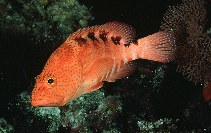| Family: |
Epinephelidae (Groupers) |
| Max. size: |
50 cm TL (male/unsexed); max.weight: 7,000.0 g |
| Environment: |
reef-associated; marine; depth range 0 - 150 m, non-migratory |
| Distribution: |
Indo-Pacific: Red Sea to South Africa and eastward to French Polynesia. Reported from the Arafura Sea (Ref. 9819). Reports by Heemstra & Randall (1984, Ref. 3153) from the Gulf of Oman, Pakistan, India, and Sri Lanka are unsubstantiated. Absent from the Persian Gulf and is not yet known from Lakshadweep Islands. |
| Diagnosis: |
Dorsal spines (total): 9-9; Dorsal soft rays (total): 14-16; Anal spines: 3-3; Anal soft rays: 9-9. This species is distinguished by the following characters: greatest body depth 2.5-3.0 times in standard length (for specimens 13-39 cm SL); head length 2.3-2.5 times in SL; longitudinal scale series 95-108; ctenoid scales on body, including abdomen; caudal fin rounded; pelvic fins not reaching or just about the anus, 1.9-2.3 in HL. Colour of body orange-red, with small blue spots sparsely scattered but more densely on head and median fins; head also with elongated blue spots and lines; body with 4 dark bars (sometimes very faint) merging dorsally with blackish blotches at base of dorsal fin and extending onto the fin; 2 similar but smaller dark bar/blotches on caudal peduncle (Ref. 39231, 90102). |
| Biology: |
Adults are found in rich coastal to outer reefs, usually along deep walls with caves, rich with invertebrate growth such as large sponges or soft corals (Ref. 48635). They occur singly or in small groups (Ref. 90102). A secretive species which are active nocturnally in shallow water and diurnally in deeper water (Ref. 5222). They are often seen with the cleaner shrimp Periclimenes elegans (Ref. 37816). Adults feed mainly on fishes (Ref. 5222) and reach sexual maturity at 25 cm SL (Ref. 89707). Probably of commercial interest to certain local fisheries. Are caught with hook-and-line, traps, and spear (Ref. 39231). Minimum depth reported taken from Ref. 128797. |
| IUCN Red List Status: |
Least Concern (LC); Date assessed: 16 October 2017 Ref. (130435)
|
| Threat to humans: |
harmless |
Source and more info: www.fishbase.org. For personal, classroom, and other internal use only. Not for publication.
